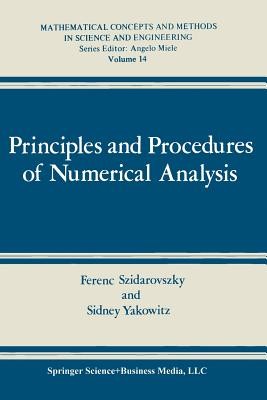
- We will send in 10–14 business days.
- Author: Ferenc Szidarovszky
- Publisher: Springer
- ISBN-10: 0306400871
- ISBN-13: 9780306400872
- Format: 15.2 x 22.9 x 1.8 cm, minkšti viršeliai
- Language: English
- SAVE -10% with code: EXTRA
Principles and Procedures of Numerical Analysis (e-book) (used book) | bookbook.eu
Reviews
Description
It is an incontestable fact that numerical analysis techniques are used rou- tinely (although not always effectively) in virtually every quantitative field of scientific endeavor. In this book, which is directed toward upper-division and graduate level students in engineering and mathematics, we have selected for discussion subjects that are traditionally found in numerical analysis texts. But our choice of methodology rejects the traditional where analysis and experience clearly warrant such a departure, and one of our primary aspirations in this work is to equip the reader with the wherewithal to apply numerical analysis thinking to nontraditional subjects. For there is a plethora of computer-oriented sciences such as optimization, statistics, and system analysis and identification that are sorely in need of methods comparable to those related here for classical numerical analysis problems. Toward uncovering for the reader the structure of numerical methods we have, for example, devoted a chapter to a metric space theory for iter- ative application of operators. In this chapter, we have collected those definitions and concepts of real and functional analysis that are requisite to a modern intermediate-level exposition of the principles of numerical anal- ysis. Further, we derive the abstract theory (most notably, the contraction mapping theorem) for iteration processes.
EXTRA 10 % discount with code: EXTRA
The promotion ends in 23d.19:08:30
The discount code is valid when purchasing from 10 €. Discounts do not stack.
- Author: Ferenc Szidarovszky
- Publisher: Springer
- ISBN-10: 0306400871
- ISBN-13: 9780306400872
- Format: 15.2 x 22.9 x 1.8 cm, minkšti viršeliai
- Language: English English
It is an incontestable fact that numerical analysis techniques are used rou- tinely (although not always effectively) in virtually every quantitative field of scientific endeavor. In this book, which is directed toward upper-division and graduate level students in engineering and mathematics, we have selected for discussion subjects that are traditionally found in numerical analysis texts. But our choice of methodology rejects the traditional where analysis and experience clearly warrant such a departure, and one of our primary aspirations in this work is to equip the reader with the wherewithal to apply numerical analysis thinking to nontraditional subjects. For there is a plethora of computer-oriented sciences such as optimization, statistics, and system analysis and identification that are sorely in need of methods comparable to those related here for classical numerical analysis problems. Toward uncovering for the reader the structure of numerical methods we have, for example, devoted a chapter to a metric space theory for iter- ative application of operators. In this chapter, we have collected those definitions and concepts of real and functional analysis that are requisite to a modern intermediate-level exposition of the principles of numerical anal- ysis. Further, we derive the abstract theory (most notably, the contraction mapping theorem) for iteration processes.


Reviews